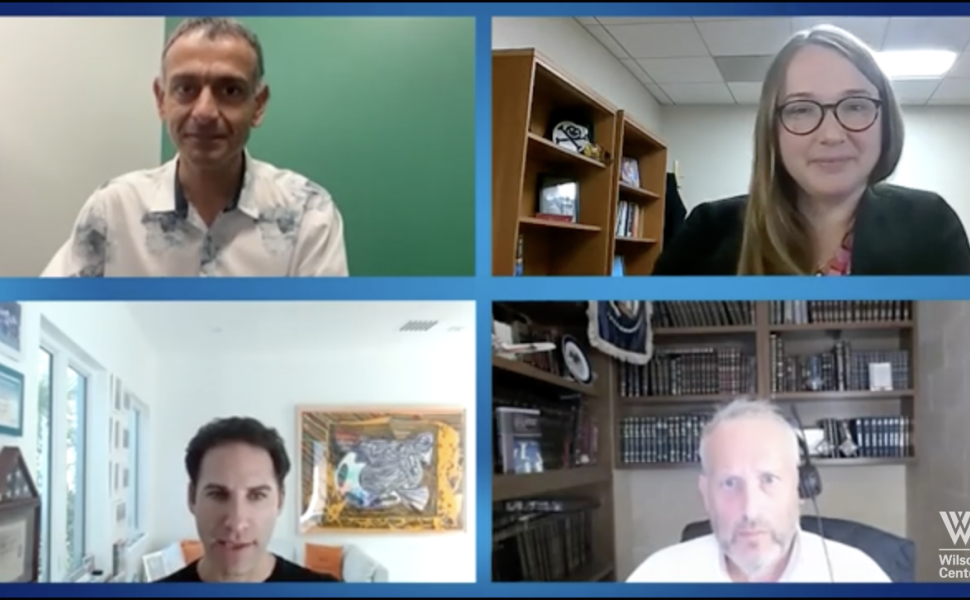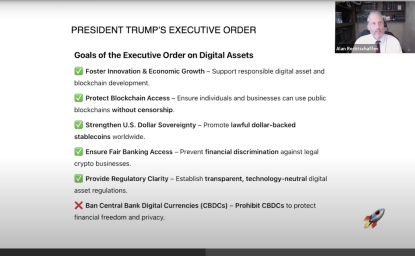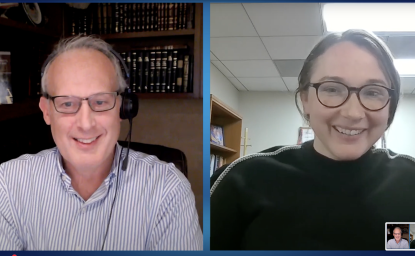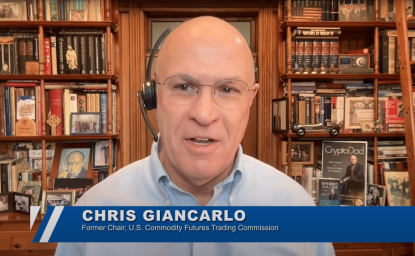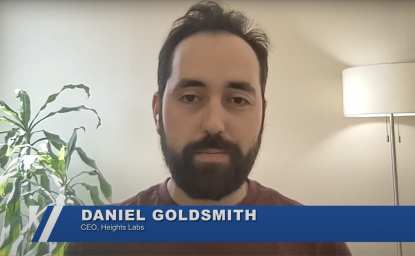Narrator: Welcome to Blockchain Explained, a podcast about opportunities, challenges, and trends in blockchain technology. Whether you're a beginner or an expert, a developer or just crypto-curious, this podcast is for you. It features industry leaders and government officials discussing the world of distributed ledgers, cryptocurrencies, and the metaverse. And now, here are your hosts, Alan Rechtschaffen and Kellee Wicker.
Alan Rechtschaffen: Welcome to today's episode of Blockchain Explains which is really a very special episode. On today's episode, we're going to talk about the two technologies which are capturing all the headlines, blockchain and artificial intelligence. And this is a very special episode to us, because early on at Wilson Center, we decided to house and to silo those two technologies in the same area, within our academic research programs and at Wilson Center, we have looked carefully at the integration of these two technologies, trying to understand the connection between blockchain, cryptocurrency and artificial intelligence. And these are technologies that not only affect the financial system, but affect national security and public sector operations and have much greater reach, so much so that the President United States, President Trump, has signed two executive orders, one on artificial intelligence, one on blockchain technology and cryptocurrency, to ensure that the United States remains at the forefront of this technology and really has a leadership role. He created a position of a czar that would not only handle one of those two technologies, but would look at both blockchain technology and artificial intelligence, and this synthesis of the two technologies is what we're here to discuss today. And this holistic exploration of their combined impact on financial stability, on digital security and on economic competitiveness is what we're here to discuss on this very special episode of Blockchain Explained. And we have an old friend here, I don't mean that by age, but an old friend here, Michael Greenwald, who's been with us before. We have a new friend, Paul who is the General Counsel of Coinbase, but I'm going to turn it over to my cohost, who I love working with, and who has helped me build, help Wilson Center build out Blockchain Explain. Kellee wicker, who handles all our technology efforts, and who has importantly realized early on that there is an integration of these two global world, changing history, changing technologies. Kellee, I'll turn it over to you.
Kellee Wicker: Yeah, thank you. And just to put a fire point on it, we do have two really exceptional guests here. Michael is the Global Head of Financial innovation and digital assets at AWS, and Paul is the chief legal officer at Coinbase Global. So they really know their stuff. They put out a post. You guys coauthored a post in October about the intersection of AI and digital assets, really laying out what actually is possible. But I'd love to hear live from you. These are two very buzzy technologies. What does it actually mean when we're working at the intersection of these two techs?
Michael Greenwald: Happy to kick off. I mean, I think Paul and I got together, we've been seeing this coming for a while. And the reason why we called it, you know, Kellee and Alan a convergence, is really because these two emerging technologies, digital assets and generative artificial intelligence. You know, when used together, they're transforming public center, you know, entities. And when we really think big about what this means, it's going to be creating new levels of efficiency, security, financial innovation, inclusion, and really goes into how it can be used to prevent fraud, waste, abuse in public sector organizations.
Paul Grewal: Yeah, it's interesting, Michael, isn't it that when you and I first started speaking about this overlap, I think there was an instinct in each of these industries and each of these research spaces that the two innovations really could reinforce one another and bolster each of their ability to have large scale impact on a public sector infrastructure. I think since that time, what we've seen is actually, if anything, an acceleration of that model and a much deeper appreciation of its potential. The President's recent executive orders, I think actually are the best example of this, where you're seeing AI and crypto really being talked about as a unified part of American technology strategy and Technology Policy, which is very, very exciting.
Alan Rechtschaffen: And when you talk about this integration of these two disparate technologies, and maybe they're not so disparate. Where do you see it, beyond the public sector? How do you see it affecting everyday lives of people who are using technology?
Paul Grewal: Well, I think that perhaps the biggest impact that we're going to see is in the way in which. artificial intelligence, and in particular, generative AI is going to simply, is going to make it easier for consumer and public facing companies to deploy blockchain based networks and technologies to address, you know, issues regarding decentralization of of records, of decentralization of information in powerful ways. And just to give a very quick but concrete example of this, a huge challenge we have here at Coinbase is bringing our customers on board into crypto, whether it's in reviewing initial applications, conducting due diligence and then or monitoring transaction activity on the platform as customers begin to engage more and more with our products and services, AI has already proven to be a tremendous force multiplier for our teams to work through a lot of otherwise very manual processes for confirming information and investigating potential issues in ways that just make it simpler, faster, easier, and ultimately cheaper for people to be on a cryptocurrency platform like Coinbase and to begin to engage in new ways with with which to conduct their financial lives online, and their broader lives online.
Michael Greenwald: Yeah, and I think Alan, if you look at the President's Executive Order, this administration is really promoting economic competitiveness and removing these barriers that will be for that place. So I think if you look at these innovations, they're at the heart of paving the way for revolutionizing the financial system and revolutionizing the US financial system. And that really emphasizes the core themes of equity, access, transparency, efficiency, and really that emphasizes a clear sign that the intersection of cloud computing, you know, AI, technology and digital assets, that's going to define the economic competition, but promote US economic competitiveness.
Kellee Wicker: I want to pick up on something Paul was talking about, you were talking about AI accelerating how Coinbase can get people into the crypto ecosystem. I know one thing we hear a lot from people is that sometimes the learning curve on crypto can be daunting for users. Is there also a benefit for customers? Like, is there a way for customers to be using AI to get into what can be kind of a difficult UX in some ways.
Paul Grewal: Yeah. There's no question about it that historically and maybe even at present, crypto remains largely opaque or certainly at least intimidating to the vast majority of of regular people just trying to do regular things without necessarily an aptitude or an appetite for innovation or the technology behind it. What I think is most exciting is that we're quickly moving to a next phase within digital assets and blockchain based technologies, where the technology really is a means to an end and often hidden or irrelevant to the problems that can be solved, whether it's moving money across borders in a cheaper, faster, more efficient way, whether it's providing for greater ownership of content online and as part of decentralized social networks. So as we're starting to see the networks, the tokens, the ledgers, all of these concepts that are quite nebulous and far removed from most people's daily experience recede into the background. I think what you're going to see is generative AI emerge as the way to translate these concepts into actions, into actual products and services that people just want to use to go about their daily business.
Alan Rechtschaffen: Yeah, one of the things we've been doing at Wilson is we've been building up our series of blockchain briefs to really help people to be able to understand the evolution in this area, to understand the use cases of the blockchain. And I was wondering, Michael, I want to ask you a question. And Paul, of course, chime in also. Michael and I first met when you were at the United States Treasury, and I was wondering if there is some thought that you and Paul, or the people at AWS, are looking at in terms of how an integration of blockchain technology and artificial intelligence could ultimately one day impact things like monetary policy and fiscal policy, because it seems like there's something there, and I don't even know what it is, but it seems like there's some, some kernel of an idea that this could be impactful, as people talk about the idea of a 2% inflation target and what that means and and if you want to be more formulaic or less formulaic, How does that all play out? And is there a role for this, this convergence of technologies in monetary policy and fiscal policy?
Michael Greenwald: Think your instincts are moving in the right place, Alan, because I think both Coinbase and AWS, they see significant potential for generative AI to enhance, you know, first, the security and efficiency of blockchain. So before we can get to what you're discussing, we need to make sure that exchanges and payments and other financial services that sit on top of blockchains and then rely on compute power, you know, powered by AWS, you know, from onboarding customers and verifying IDs and monitoring transactions and identifying bad actors. So I think that's one level, and then converging the two together to see what's the art of the possible to create not just a healthier economy, but to look out and see what has occurred before, and what patterns can we learn moving forward to create a more competitive financial sector.
Paul Grewal: Yeah, I couldn't agree more. Michael, I mean, you know, in terms of macroeconomic impact and effect, there's no question that generative AI tools can help either cut costs or cap growth, or, in many cases, actually be deflationary, in lowering the overall cost of ownership and cost to deliver services for a wide range of products that you know, regular Americans, again, buy each and every day. The other thing, though, I think, to bear in mind is that separate, apart from the efficiency gains from these technologies, I think, is the possibility, and I would argue, the probability, that it will see real competition introduced into traditional financial markets and for traditional financial services, you know, something like, you know, 10% or less of Americans right now have strong confidence in the traditional financial system and with the institutions that provide those services. I have no doubt that as we see more and more of these technologies deployed, you're going to see real competition come to those markets. And with that, I think, you know, more and more Americans feel like they've got real choice that up until this point, hasn't been available.
Kellee Wicker: I wanted to talk a little bit about this, you know, competition and TradFi. And then you mentioned the low trust people have in financial networks. And I know crypto has also kind of suffered from some public image issues. We actually I'm going to put in a plug for my own stuff. At the end of this month, we're going to be releasing a report on the misconceptions about illicit finance in cryptocurrency and decentralized finance. And so I think all of us here probably know the abuse and the fraud is really a pretty small percentage of the economy of crypto, even versus TradFi. But how do we is there a role for AI to play in kind of rehabilitating cryptocurrency in the public trust?
Paul Grewal: Yeah, I think there's a huge role to play, actually, because the fact of the matter is, crypto has had a significant trust problem. And it's ironic, because I think so many of the issues that have caught the public's attention have really resulted from a lack of transparency, a lack of insight into how institutions, particularly centralized institutions within crypto, have managed people's funds. And I say ironic, because the whole promise of digital assets, the whole promise of blockchain based public networks, is that there is, in fact, much stronger, in fact, perfect transparency into where assets sit, who has control and what may be taking place. That is appropriately that you know, the concern of law enforcement agencies and others you know, charged with keeping the public safe. So I do think Gen AI can help restore that trust, and already has started to make a difference, in large part by just making it easier, by making it faster, and making it more reliable for people to come on chain and into the crypto economy, and to begin to use blockchain based products and services that offer real choice and competition to traditional products and services that have not always engendered the public's trust and confidence.
Michael Greenwald: Yeah, I couldn't agree more, Paul. I mean, I think what you're seeing is we're in chapter two of democratizing financial access, and that really enhances efficiency and it creates more trust in the digital asset landscape. And you know, one of the things I really admire about what Paul and Coinbase are. Doing is that they're aiming to enhance the overall trust of that landscape, and that's really been a hallmark of what they've been doing. You know, we're trying to make sure that with the vast potential of generative AI, to really build out different experiences for our customers, there's different ways they want to interact with the federal, you know, financial system, and hopefully that boosts productivity, but it democratizes their access and it builds trust.
Alan Rechtschaffen: You know, I want to, I want to ask you a question about that. Now we've saved the tough questions for the end. I hope you don't mind, but when we talk about the democratization of the use of these assets, one of the things that I think has come become clear in the President's executive order on cryptocurrency and in his position prior to being elected President, on Central Bank digital currencies, and on the nature of the privacy issues associated with them. Is it not a risk that, as there becomes more of a corporate move towards some integration of digital assets, cryptocurrency and artificial intelligence, that which we were concerned about, or the President has been concerned about, in terms of CBDCs, Central Bank, digital currencies, all we've done is ceded that to corporate centralized authority and allowed the corporate centralized authority to have access to that private information that The President was trying to protect and trying to prevent CBDCs?
Paul Grewal: Yeah, I think that you know, skepticism is warranted if you consider the history of centralized intermediaries and personal information and personal data on the internet over the last 25 years. I actually think, though, that with Blockchain based technologies, and particularly those that use generative AI tools to facilitate onboarding and monitoring of activity, we have a chance to really flip the paradigm, because the fact of the matter is, these tools allow us, among other things, to be much more circumspect and much more specific in what information we collect and require of customers and other participants on these networks. And so the whole idea that data, by default, should be accumulated, collected, preserved and stored and and owned, separate and apart from the customers who provide it, I think will quickly give way to a much more open, much more transparent model that puts the power of ownership and control back in the hands of the people who are responsible and ultimately have a legitimate claim on that type of data. So I think the technology can address that. But implicit in your question is,will the companies participating in this do better than we've seen in the past? And I think, frankly, they better do better if they want to continue to earn and grow consumer confidence and consumer trust?
Michael Greenwald: Yeah. I mean, I think it's clear that we've entered a new, modern paradigm with this executive order, and I think we're in a moment where the customer wants to exchange value different ways, and they want choice, and that may be through traditional central banks, that may be through dollar based stable coins, or that may be through Web 3, but the onus is on the customer to have the option, and I think that optionality will breed more trust, but also more competitiveness for the United States, and what we may see Alan is dollar based stable coins potentially be part of a redollarization effort moving forward, and that plays right into the executive order for economic competitiveness in a better, faster, cheaper, more efficient system for customers.
Kellee Wicker: Well, I know we're out of time here, so I want to thank both of you for joining us. We'll drop the link to your post in the description for this episode so people can go read more. Thanks again for and we've had Michael before. It was wonderful to have Paul for his first visit. Maybe we can get you back as well. And thanks to our listeners as well for joining us for yet another episode of Blockchain Explained.

